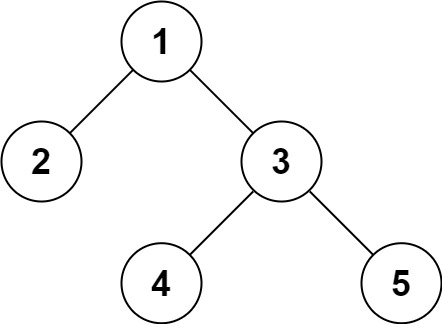297. Serialize and Deserialize Binary Tree
1. Description
Serialization is the process of converting a data structure or object into a sequence of bits so that it can be stored in a file or memory buffer, or transmitted across a network connection link to be reconstructed later in the same or another computer environment.
Design an algorithm to serialize and deserialize a binary tree. There is no restriction on how your serialization/deserialization algorithm should work. You just need to ensure that a binary tree can be serialized to a string and this string can be deserialized to the original tree structure.
Clarification: The input/output format is the same as how LeetCode serializes a binary tree. You do not necessarily need to follow this format, so please be creative and come up with different approaches yourself.
2. Example
Example 1:
Input: root = [1,2,3,null,null,4,5]
Output: [1,2,3,null,null,4,5]
Example 2:
Input: root = []
Output: []
Example 3:
Input: root = [1]
Output: [1]
Example 4:
Input: root = [1,2]
Output: [1,2]
3. Constraints
- The number of nodes in the tree is in the range [0, $10^4$].
- -1000 <= Node.val <= 1000
4. Solutions
My Accepted Solution
n is the number of nodes in i_root
Time complexity: O(n)
Space complexity: O(n)
We could get the tree’s preorder and inorder iteration(or inorder and postorder), then rebuild the tree. But we should ensure that there is no duplicate nodes in the tree, but the problem doesn’t give that ensurance.
Then, we could also just get a preorder iteration, and we keep the nullptr node using a special letter(like ‘#'), then we could rebuild the tree.
class Codec
{
private:
TreeNode* deserialize(stringstream &i_stream)
{
string node;
i_stream >>node;
if(node == string("#"))
{
return nullptr;
}
else
{
int value = stoi(node);
auto root = new TreeNode(value);
root->left = deserialize(i_stream);
root->right = deserialize(i_stream);
return root;
}
}
public:
// Encodes a tree to a single string.
// string serialize(TreeNode* root)
string serialize(TreeNode *i_root)
{
if(!i_root) return string("# ");
string nodes = to_string(i_root->val) + string(" ");
return nodes + serialize(i_root->left) + serialize(i_root->right);
}
// Decodes your encoded data to tree.
// TreeNode* deserialize(string data)
TreeNode* deserialize(string i_data)
{
stringstream stream(i_data);
return deserialize(stream);
}
};